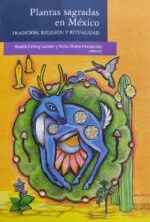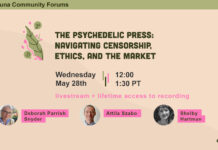- Why the Psychedelic Community is so White - April 12, 2018
The War on Drugs is inherently anti-black. You can’t have a drug war without racism.
Most psychedelic users that I’ve encountered are hesitant to take a stance on the racial aspects of the war on drugs, yet white people benefit from the ways that it affects black and brown communities. For example, white people aren’t arrested for drug crimes at the same rate as black and brown people (despite all races using drugs at the same rates). Our local, state and federal government only starts to care about opioid abuse when white folks begin to die from overdose.
As a black person, I don’t feel comfortable in a lot of psychedelic spaces
As a black person, I don’t feel comfortable in a lot of psychedelic spaces if no one’s talking about the racism inherent to the war on drugs. In the psychedelic community, people will talk about the unfairness of the drug war and how it violates people’s autonomy, but they refuse to name racism – ignoring the biggest elephant in the room. By failing to make the implicit explicit, the psychedelic movement excludes people of color, especially black people, from having their voices heard.
The ability to talk about drug use, especially psychedelic drug use, is a huge privilege in the United States. Black people are murdered by cops on a regular basis while walking down the street and minding their own business, just for being black; so imagine the risk for black people that comes with talking openly about psychedelics. Imagine what would happen if large numbers of black people gathered to talk about healing our trauma with psychedelics. Such a convening would probably be shut down quickly by the state, much like they did with the MOVE bombings in Philadelphia, the Black Panther Party, Black Wall Street and more recently, the Ferguson uprising and Standing Rock.
We, as black people, risk our lives every day just by being black; so it should come as no surprise that we hesitate when it comes to openly speaking about drug use.
Black and indigenous populations have long used plant medicine for everything from treating common ailments, to enhancing the senses for hunting. The arrival of European imperialism to black and indigenous lands marked the beginning of our loss of culture and ownership surrounding these plant medicines. Folks like my mother maintain a deep connection to herbalism and plant medicine, but thanks to the effects of imperialism and the medical industrial complex, it’s a practice that is slowly dying.
You can find examples of this everywhere: from Mexico to Zimbabwe, where white colonizers came and told the native peoples that their way of healing and grooming was barbaric. Today, white people go places like the Amazon or Gabon to reap the benefits of indigenous medicines, yet how do we reconcile the fact that many of their ancestors destroyed a multitude of cultures in their arrival to the West? How can people of color feel comfortable in a movement that refuses to acknowledge this violent past? Today, ayahuasca and iboga are being researched for the individualized healing of white consumers, but how many of these people are giving back to the communities from which they take? What would happen if these outsiders used their resources to repair the harm that has been done to indigenous communities?
Recently, I attended a panel in New York City titled “Why is the Psychedelic Movement Whiter than the Tea Party?”
Recently, I attended a panel in New York City titled “Why is the Psychedelic Movement Whiter than the Tea Party?” where all of the panel attendees were people of color – a rarity for psychedelic events. I appreciated the overall sentiment of the panel; however, the question, “why is the psychedelic movement whiter than the tea party?” assumes that black folks have always had an equal footing in this country, when history proves that it has been quite the opposite. The drug war has disproportionately impacted our communities for generations, incarcerating an alarming number of black and brown people throughout the years – including my family members.
Today, there are a number of drug policy organizations that lack people of color on staff, or don’t make it a priority to stand against racism. Neutrality in the face of oppression is racism. Silence is racism. The election of Donald Trump shows what happens when powerful people and institutions remain neutral or quiet when confronted with bigotry. The fact that Trump performed well among white voters says a lot about what marginalized folks are up against. Now is the most crucial time for privileged folks to put their money where their mouth is, and actually support marginalized individuals and groups!
The psychedelic movement could be more inclusive for women and people of color by listening to its black voices, such as Kai Wingo (rest in peace)
The psychedelic movement could be more inclusive for women and people of color by listening to its black voices, such as Kai Wingo (rest in peace), a black woman who started the first Women and Entheogens Conference this past year in Cleveland and launched her own mushroom farm where she gave workshops on urban farming. Additionally, the movement should heed others like Baba Kilindi Iyi and Lady Buggs. There are many black people who use psychedelics, and other substances, out there, but dealing with the consequences of the racist war on drugs is a harsh reality all black folks have to deal with. Because racism is at the core of the war on drugs, it would benefit the psychedelic movement to fight against oppressive institutions. It would benefit everyone in the drug policy world, from people who work on policy to budtenders in the cannabis industry, to center their work around anti-racism and other forms of oppression instead of perpetuating these harms within our movement.
As a black person who has taken many psychedelic trips
As a black person who has taken many psychedelic trips over the past three years, I’ve experienced the truths that these substances have brought me. I’ve seen my ancestors and heard mother Earth speak to me, and felt a happiness like no other. I want all black people who are interested in psychedelics to have the opportunity to experience this in a safe environment. Yet safety is a myth for black people in this world. Despite that, black people look oppression in the eyes and say “fuck it, I am going to heal.” Any black person who attempts to heal from the harms of white supremacy is committing an act of resistance because we live in a world that tells black people our lives don’t matter. The whiteness of the psychedelic movement tells black people that our trauma doesn’t matter either, and that even our traditional recourses and practices are up for sale.
This article was originally published in Psymposia as part of the Psychedelic Diversity Conversation.
Take a minute to browse our stock:
Did you enjoy reading this article?
Please support Chacruna's work by donating to us. We are an independent organization and we offer free education and advocacy for psychedelic plant medicines. We are a team of dedicated volunteers!
Can you help Chacruna advance cultural understanding around these substances?















